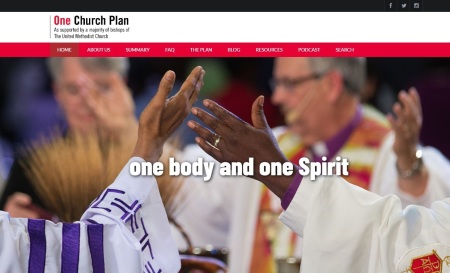UMC bishops launch site in support of plan to alter Church's stance on homosexuality

A group of United Methodist Church bishops have launched a website dedicated to promoting a plan meant to change the denomination’s official biblical position on homosexuality, stating that it is a sin.
In February 2019, the UMC will hold a special session of General Conference meant to resolve the yearslong debate over the denomination’s stance on LGBT issues.
A proposal known as the “One Church Plan” would remove the Church’s biblically-based opposition to homosexuality, allowing instead for regional bodies to determine their stance on the issue.
The site includes content by bishops who support the One Church Plan, including Bishop Kenneth H. Carter Jr., president of the UMC Council of Bishops.
A statement posted to the website by Bishops Carter, Cynthia Fierro Harvey and Sue Haupert-Johnson explained the site is meant to serve as “an informational and resource point.”
“The bishops maintain their commitment to their consecration vows to guard the faith and the unity of the church,” the bishops said.
“They continue to focus their leadership borrowing the words from the Vision, Mission, and Scope that has guided their work through these two years: To multiply the United Methodist witness in as many places in the world as possibly while maintaining as much unity as possible.”
Carter told the United Methodist News Service in an interview published Tuesday that he hopes the site will prevent the debate over the One Church Plan from being hijacked by critics.
“If we have affirmed the One Church Plan but do not interpret or define it, it will be defined by those who do not support it — on the right and the left,” Carter said in his interview with the UMNS.
In May, a majority of the Council of Bishops endorsed the One Church Plan, saying in a statement that the plan “allows for contextualization of language about human sexuality in support of the mission; and allows for central conferences, especially those in Africa, to retain their disciplinary authority to adapt the Book of Discipline and continue to include traditional language and values while fulfilling the vision of a global and multicultural church.”
“This plan also encourages a generous unity by giving United Methodists the ability to address different missional contexts in ways that reflect their theological convictions,” added the Council.
Groups like the theologically conservative Good News Magazine have been critical of the One Church Plan, arguing in part that it will fail to promote unity by alienating many in the denomination.
In a column published earlier this week, GNM Vice President Thomas Lambrecht wrote that many members and congregations have told his organization that they plan to leave the UMC if the plan is approved.
“In a poll this year in North Georgia, fully one-fourth of the annual conference members said that they would leave the church if the OCP is adopted,” wrote Lambrecht.
“I estimate that the U.S. part of our church could lose anywhere from 10 to 25 percent of its membership in this scenario, and it is possible that up to a half-dozen annual conferences might seek to withdraw.”
Lambrecht also warned that the One Church Plan does not have a provision for allowing congregations to leave the denomination with their property.
“If General Conference provides no exit path, it is likely that much money will be spent on court battles over local church property. Money that could have gone to mission and ministry will instead go to pay lawyers,” continued Lambrecht.
In addition to the One Church Plan, delegates for the 2019 special session of General Conference will also consider two other proposals, the Traditional Plan and the Connectional Conference Plan.
The Traditional Plan would maintain the current standards of the UMC regarding sexual ethics while giving a “gracious exit” option for churches and clergy who cannot accept those standards.
The Connectional Conference Plan would establish three loosely connected conferences, each with a different position on the debate, with local bodies getting to choose which conference to join.





















